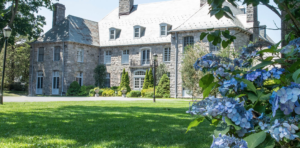A group of homeowners in the exclusive Milton Point neighborhood of Rye are questioning the religious bona fides of Wainwright House Inc., in an attempt to stop the nonprofit organization from holding weddings in a tent on the site.
A dozen neighbors petitioned Westchester Supreme Court on Dec. 21 to annul a decision by the Rye Planning Commission that cited religion in allowing the organization to continue holding weddings and other events in a seasonal tent.

“There are serious questions as to whether Wainwright House is, in fact, a religious institution,” the petition states. “Indeed, Wainwright only seems to claim its ‘religious’ pedigree when it is useful in securing approval for its commercial activity.”
The property traces its history to 1864, when John and Margaret Wainwright bought Milton Point on the Long Island Sound. The house itself was built in 1931 by Col. J. Mayhew Wainwright and modeled after an 18th-century French chateau where he was stationed during World War I.
His daughter, Fonrose Wainwright Condict, created Wainwright House Inc. in 1951 as a memorial to her parents, according to its website, “with the belief that there should be a place under one roof where people from all backgrounds and beliefs and even no beliefs at all could aspire to have a deeper understanding of others.”
The organization identifies itself as a center for developing human potential, through yoga and meditation classes; educational, cultural and spiritual programs; community events; corporate wellness events; and workshops and retreats.
According to a 2017 IRS form, the latest publicly available tax return, Wainwright House is a “nonsectarian center for learning which offers educational programs, retreats and conferences.”
In 2011 and again in 2015, the Rye planning commission approved use of a seasonal tent for weddings and events, for raising funds for the organization.
This past March Wainwright House asked the planning commission to renew its approvals and to allow even more events: 15 weddings instead of 10 and an additional four “cultural or community events with amplified music.” It described the request as essential “to stay afloat.”
Weddings, according to the application, are sacred ceremonies and celebrations, and the site can be used by “all different faiths and religious traditions.”
The application acknowledged past complaints by neighbors but attributed their concerns to a “vigorous propaganda campaign … premised on false claims that is would somehow ‘commercialize’ Milton Point.”
The application singles out “the Alexanders” ”” apparently, Robert and Elizabeth Alexander, who own two houses next to Wainwright House and who are the lead plaintiffs in the lawsuit ”” who seek to “elevate the property rights of a wealthy single-family homeowner above those of a much longer established Rye institution.”
The planning commission approved Wainwright House’s requests in September, citing, in part, federal law that encourages land use for religious purposes.
The neighbors claim that the planning commission acted beyond its legal authority.
First, the 2015 approvals expired on Oct. 1. The organization was required to submit a renewal application a year in advance but missed the deadline by five months.
Second, the planning commission stated that it had considered and relied on analysis and findings of a State Environmental Quality Review Act document. But the SEQRA document was reviewed after the Wainwright House approvals, according to the petition, in violation of the state law.
Third, the neighbors argue, the planning commission cited no evidence that Wainwright is a religious institution.
“That is a fatal flaw,” the petition states.
While Wainwright House’s core values are rooted in Christian temperance, according to the petition, “in practice it seems to expressly deny any religious affiliation or creed.” It is essentially “a commercial rental facility and catering hall.”
Kristen K. Wilson, the Rye corporate counsel, and Robert Manheimer, the president on Wainwright House, did not respond to an email asking for their sides of the story.
The neighbors are represented by Rhinebeck attorney Joseph P. Eriole.




















